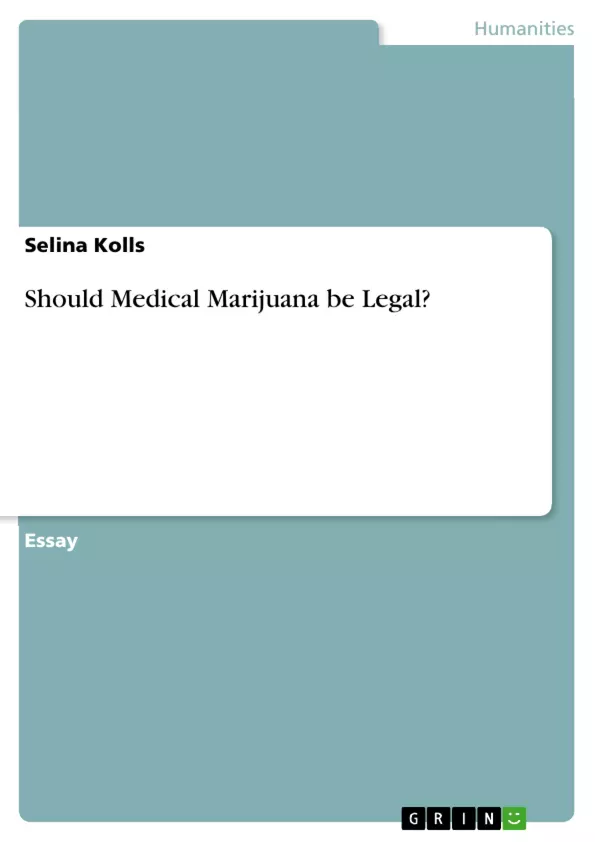This essay argues that medical marijuana should be legal because it is safer, and cost effective. Marijuana is an illegal drug that is obtained from the flowers of a plant known as Cannabis sativa. The most effective compound in the drug known as Tetrahydrocannabinol (THC) and it has some significant effects on the human mind. These effects include changes in a person’s mood, an increase of appetite, euphoria, and even hallucinations.
This drug has been used for recreational purposes for thousands of years. It was not until the 1930s that the drug was made illegal for both its use, possession, and distribution. Recently, scientific research has shown that some components found in THC can be used for health purposes. These findings enabled medical marijuana to be legalized in several states within the United States. However, skeptics are still against this drug due to its side effects and the potential impact on the community. This essay will argue the different sides of this issue and offer a viable solution.
Frequently Asked Questions
What are the reported overdose cases of the drug mentioned in the text?
According to the text, there are no reported cases of overdose from this drug, implying a high lethal dose compared to the recommended treatment dosage.
What are the comparative negative effects of synthetic prescriptions like oxycodone and THC on the human body?
The text indicates that scientific studies have shown synthetic prescriptions such as oxycodone have worse negative effects on the human body compared to THC.
What makes marijuana a potentially more innocuous option for pain relief?
Marijuana is portrayed as a possibly more innocuous option due to its comparatively harmless nature and lower cost relative to pharmaceutical drugs.
What are the negative capabilities of THC in medical marijuana?
The text identifies THC's mind-altering capabilities as a negative aspect, mentioning routes of administration like smoking that can cause throat and lung cancer, along with risks of addiction.
What are the potential effects of long-term marijuana use?
Long-term marijuana users are described as being at risk of addiction and becoming unproductive members of society due to impaired motor functions and decision-making abilities.
What are some benefits of medical marijuana use based on the text?
The text cites research indicating that medical marijuana can help cancer and AIDS patients manage weight loss by increasing appetite, and can provide quick pain relief.
Why does the text claim overdosing on cannabis to be highly unlikely?
The text suggests that overdosing on cannabis is highly unlikely because it would require a very large amount of the drug to have the same impact as overdosing on other medicines like aspirin.
What methods are proposed to minimize harmful side effects associated with smoking marijuana?
The text suggests using vaporization as a safer ingestion method to avoid the carcinogenic compounds found in smoke.
What conclusion is reached in the text regarding the legalization of medical marijuana?
The text concludes that the practical solution would be to validate medical marijuana, allowing more patients to safely access its benefits while also acknowledging the need to address societal stigma and conduct further research.
What works are cited in the text?
The text cites the following works:
- Cerdá, Magdalena, et al. "Medical marijuana laws in 50 states: investigating the relationship between state legalization of medical marijuana and marijuana use, abuse and dependence." Drug and alcohol dependence 120.1 (2012): 22-27.
- Friese, Bettina, and Joel W. Grube. "Legalization of medical marijuana and marijuana use among youths." Drugs: education, prevention and policy 20.1 (2013): 33-39.
- Hill, Kevin P. "Medical marijuana for treatment of chronic pain and other medical and psychiatric problems: a clinical review." Jama 313.24 (2015): 2474-2483.
- Quote paper
- Selina Kolls (Author), 2016, Should Medical Marijuana be Legal?, Munich, GRIN Verlag, https://www.hausarbeiten.de/document/338147


